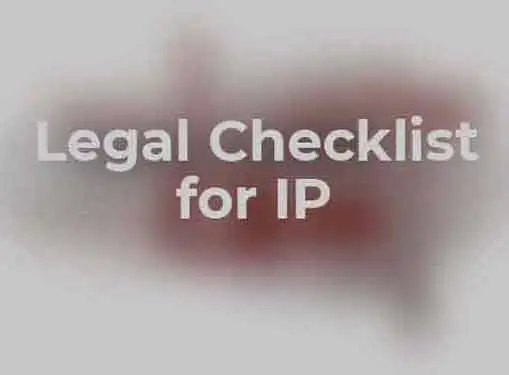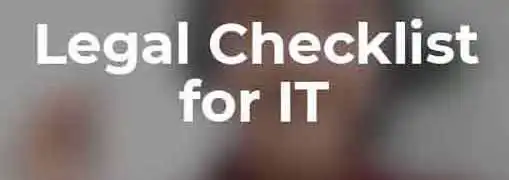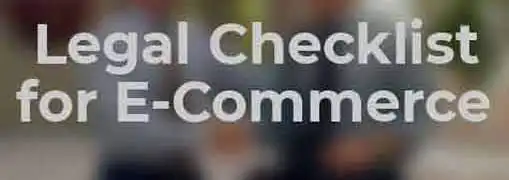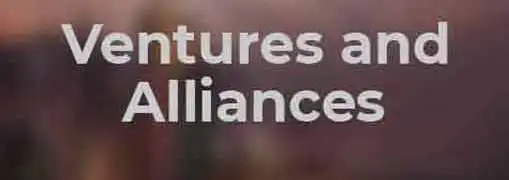Small Business Legal Issues
Legal Checklist for Intellectual Property
Is your business properly addressing key legal issues pertaining to intellectual property? This article provides a checklist of pertinent questions pertaining to intellectual property.
Patents, trademarks, and copyrights are collectively known as intellectual property. Here's a series of questions to ask yourself to determine if you have a handle on your intellectual property issues and to get a better feel for what they are.

Has your business instituted a trade secret and proprietary information protection program?
A "trade secret" generally is market, product, operating, financial, customer or other information (including, data and technology) which derives economic value from being kept secret and is the subject of reasonable efforts to maintain secrecy.
Almost every business has some sort of trade secret, which periodically must be disclosed to or used by employees, supplier, customers, contractors or others. In addition, these parties may from time to time generate valuable ideas, inventions, discoveries, creative works and other work-product in the course of their relationship with a business, as to which the business may want to control.
Consequently, every business should implement a program to protect its rights with respect to trade secrets and proprietary matters. For example, every business typically should: (1) limit disclosures of trade secrets and other confidential information only to parties who have a "need to know" such information; (2) require appropriate parties to sign written confidentiality or non-disclosure agreements; (3) require appropriate parties to sign non-competition and non-solicitation agreements; and (4) require appropriate parties to assign rights to the business with respect to inventions and work-product arising in the course of their relationship with the business.
Does your business have any brands, logos, packaging or designs that are used to distinguish its goods and services? Does it plan to develop such items?
A "trademark" is any word, name, symbol or device that is used in commerce to identify the goods of a manufacturer or seller from those of others, and to indicate the source of the goods.
A "service mark" similarly is used to identify the services of one provider from those of others. In addition to words or text, such marks may include colors, sounds, fragrances and non-functional designs or configurations. The owner of such marks has the indefinite right, subject to certain limitations, to prevent others from using confusingly similar marks.
However, such rights may be diminished or lost if they are not enforced. Although owners of marks may have certain rights pursuant to the common law, marks may be registered with the U.S. Patent and Trademark Office ("PTO") and doing so provides additional benefits.
If your business has trademarks or service marks, then it should respond forcefully against any third parties who improperly use such marks or use confusingly similar marks. Also, it should consider the benefits of seeking registration of such marks with the PTO. For example, registration constitutes strong evidence that such marks: (1) are not confusingly similar with other marks; (2) have a secondary or distinctive meaning with respect to the relevant goods or services; (3) are owned by the registrant; and (4) may be used only by the registrant in connection with the goods or services. In addition, registration may provide the basis for recovering profits, damages, punitive damages and costs in an infringement action in a federal court.
If your business plans to develop and use new marks, then - before making any major investments in promoting and using such marks - it should arrange for a search and evaluation of the availability of such marks for the intended purposes.
Can your business obtain a patent for any idea, invention or discovery? Is your business planning to develop a new product or use a new process which may have been patented by another party?
A "patent" is a grant to its holder of the exclusive right to make, sell or use an invention. The PTO examines patent applications and grants a patent if, among other things, an invention is novel, useful and non-obvious (in the view of a person of ordinary skill in the relevant art). A utility patent is the most common type, of which there are four categories: processes, machines, manufactures and compositions. The term of a utility patent is 20 years from the date of application. In addition, a design patent may be obtained for a new and non-obvious ornamental design for an article of manufacture and such a patent has a term of 14 years from its issuance. If your business plans to develop a new product or use a new process, then - before making any major investments - it should arrange for an evaluation as to whether such activities would infringe upon the patent rights of others.
Has your business registered Internet domain names which may be important to your business?
An Internet "domain name" is the electronic address to identify a computer host site, home page or web page. Just as an easy, logical or memorable telephone number can be a helpful business tool, a well-chosen domain name increasingly is important so that customers and others can readily find your businesses, products or services on the Internet and remember them. In certain circumstances, it can be beneficial to register, obtain and use related domain names to prevent competitors or others from using them. Furthermore, the competition for desirable domain names increases as more and more become taken. So, every business should register important or appropriate domain names as soon and as extensively as feasible. Also, if other parties are using a domain name containing the name or trademark of your business, then such a party possibly may be required to relinquish that domain name to your business.
Does your business create text, graphic, software, audio or film materials, such as manuals or promotional or training materials?
A "copyright" is a form of protection for original works of authorship which are fixed or reproducible in a tangible form of expression. Literary, graphic, audio-visual, architectural, musical, choreographic and other works are copyrightable, including computer programs or software. The copyright protection generally gives the owner the exclusive right to: reproduce the work; prepare derivative works based upon the work; distribute copies of the work; perform the work publicly; and display the work publicly. A copyright protects the form of expression, but it does not extend to ideas, discoveries, concepts or principles.
The copyright protection is created as a matter of law as of when the expressive work is created. The term of a copyright varies, depending upon the circumstances of the work's creation, from the 75 years from first publication to 100 years from the year of its creation to the life of the author plus 75 years. Although not required, the copyright owner may place a copyright ownership and date notice on the protected material and register the copyright with the Copyright Office of the U.S. Library of Congress. Such a notice prevents an infringer from arguing that any infringement was innocent, and such a registration provides strong evidence of ownership and entitles the owner to file an infringement lawsuit and recover certain statutory damages and attorneys fees from the infringer.
Therefore, a business should identify any valuable copyrightable works and evaluate placing notices on such works and registering them with the Copyright Office.
Share this article
Additional Resources for Entrepreneurs





Conversation Board
Have any comments, tips, advice and suggestions relevant to intellectual property legal issues? We'd love to hear what you have to say.